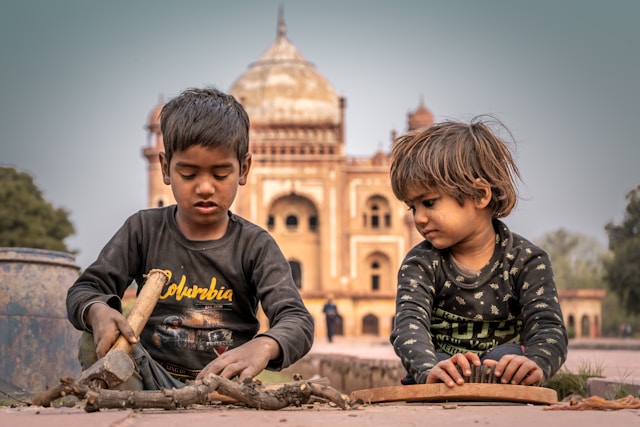Government grants for NGOs in India are the backbone of social initiatives, allowing organizations to broaden their impact and create lasting change. These grants offer vital financial support to NGOs involved in various sectors, including education for underprivileged children, rural healthcare, women's empowerment, and poverty alleviation.
However, even with these funding options available, many NGOs find it challenging to obtain financial assistance due to complicated application processes and a general lack of awareness about the government funding opportunities out there. In this article, we talk about the main government funding schemes for NGOs in India and outline the eligibility requirements, and share tips on how to apply successfully.
Broadly speaking, there are 3 major types of grants that the government of India disburses to NGOs -
- Project Grants: These fund specific programs like education, rehabilitation, or skill development projects for disadvantaged groups.
- Operational Grants: These cover recurring expenses such as salaries, rent, and administrative costs to sustain an organization’s activities.
- Capital Grants: These grants help NGOs acquire or improve physical assets such as buildings, infrastructure, or equipment.
Key Government Grant Schemes for NGOs in India
In India, several ministries are dedicated to providing financial support to NGOs that focus on social welfare, community development, and sustainable initiatives. Here’s a look at some of the key government schemes available for NGOs:
Ministry of Social Justice and Empowerment Grants
This ministry offers funding to NGOs that assist Scheduled Castes (SCs), minorities, senior citizens, and individuals with disabilities. Some of the main grants include:
- Grant-in-Aid for SCs – This grant supports education and vocational training programs specifically for Scheduled Castes.
- NAPSrC & AVYAY – These initiatives provide financial assistance aimed at elderly care.
- NAPDDR – This program funds drug rehabilitation and de-addiction efforts to help combat substance abuse.
- ADIP Scheme – This scheme aids NGOs in distributing assistive devices to individuals with disabilities.
- DDRS (Deendayal Disabled Rehabilitation Scheme) – This supports rehabilitation centers and therapy programs for people with disabilities.
Ministry of Rural Development Grants
The Ministry of Rural Development funds NGOs that are involved in poverty eradication, employment generation, and skill-building programs through the National Rural Livelihood Mission (NRLM). These grants help NGOs implement livelihood enhancement projects and empower rural communities through entrepreneurship training.
Ministry of Tribal Affairs Grants
They provide financial aid to NGOs working for the welfare of tribal communities in education, healthcare, and employment support. These grants focus on improving the tribal communities’ access to quality education for tribal students, medical services in remote tribal regions, and economic development initiatives.
Other Government Grants for NGOs
Several other ministries offer targeted grants for non-profits in India, including:
- The Ministry of Health & Family Welfare funds public health initiatives, nutrition programs, and disease prevention campaigns.
- The Ministry of Environment, Forest & Climate Change provides grants for environmental conservation projects, afforestation initiatives, and climate action programs.
- The Ministry of Women & Child Development supports NGOs working on women empowerment projects, child welfare programs, and gender equality initiatives.
Eligibility Criteria for Government NGO Grants
To qualify for government funding for NGOs in India, organizations must meet certain criteria:
- Legal Registration – The NGO must be registered under one of the following:
- Societies Registration Act, 1860
- Indian Trusts Act, 1882
- Section 8 of the Companies Act, 2013 (for non-profit companies)
- Foreign Contribution Regulation Act (FCRA) for international funding eligibility
- Operational Experience – A large number of grants require NGOs to have at least three years of operational experience and a proven track record in social work.
- Financial Transparency – NGOs must submit audited financial statements for the last three years, showcasing accountability in fund utilization.
- Project Alignment – The NGO’s proposed initiative must align with the objectives of the specific grant program, such as education, healthcare, environmental conservation, or women’s empowerment.
- NGO Darpan Registration – The NGO must be registered on the NGO Darpan Portal, a mandatory requirement for applying for government grants in India.
- Compliance with Guidelines – NGOs must adhere to the terms set by the respective ministry, including submission of progress reports and utilization certificates.
How to Apply for Government Grants for NGOs
To successfully secure NGO funding from the government, organizations should:
- Register on the NGO Darpan Portal – This is mandatory for all NGOs seeking government grants in India.
- Prepare a detailed project proposal – Clearly outline your objectives, budget, and expected impact.
- Apply through the respective ministry’s grant portal – Check eligibility criteria and required documentation before submission.
- Follow up on application status – Engage with relevant authorities to track your grant request.
By leveraging government financial support for NGOs, organizations can enhance their social impact, expand operations, and create long-term change. Staying updated with new NGO funding opportunities in India and improving grant-writing skills can significantly boost an NGO’s chances of securing government aid.
Tips to Make Your Application More Successful
Applying for government grants for NGOs can be highly competitive. To improve your chances of securing funding, follow these key strategies:
1. Ensure Proper Registration & Compliance
- Register your NGO under the Societies Registration Act, Indian Trusts Act, or Section 8 of the Companies Act.
- Enroll in the NGO Darpan Portal, which is mandatory for most government grants.
- Ensure your FCRA registration (if applying for foreign grants) and tax compliance (12A & 80G certification) to gain credibility.
2. Write a Strong and Clear Project Proposal
- Clearly define your project objectives, impact goals, and implementation strategy.
- Use data and case studies to showcase the problem your NGO is addressing.
- Outline a realistic budget with a breakdown of costs and expected outcomes.
3. Highlight Past Achievements & Impact
- Showcase previous projects, success stories, and measurable results.
- Provide testimonials, case studies, or partnerships with reputed organizations.
- Use annual reports and audited financial statements to demonstrate transparency.
4. Align with Government Priorities
- Study the latest government policies and funding priorities (e.g., rural development, women empowerment, healthcare).
- Ensure your project directly addresses these focus areas.
- Use keywords from the government’s objectives in your proposal to strengthen relevance.
5. Maintain Strong Financial Documentation
- Submit properly audited financial statements for at least 3 years.
- Clearly outline how previous grants (if any) were utilized.
- Maintain a transparent record of expenses and funding sources.
6. Network & Build Strategic Partnerships
- Engage with government officials, policymakers, and funding agencies to better understand expectations.
- Collaborate with other NGOs or corporate CSR initiatives to increase credibility.
- Attend funding workshops, grant training programs, and government seminars.
7. Submit a Well-Formatted, Error-Free Application
- Follow all submission guidelines carefully and provide all necessary supporting documents.
- Avoid grammatical errors, vague descriptions, or missing financial details.
- Keep the proposal concise yet compelling, ensuring it’s easy to understand.
Other Forms of Grants & Funding for NGOs
While government grants for NGOs provide significant financial support, organizations can also explore other funding sources:
- CSR (Corporate Social Responsibility) Grants – Many companies allocate funds to NGOs as part of their CSR initiatives, supporting causes like education, healthcare, and environmental conservation. (Read more about CSR funding)
- International Grants & Foreign Aid – Global organizations, foundations, and embassies offer funding opportunities for NGOs in India, especially for human rights, climate change, and poverty alleviation. (Explore international grants)
- Crowdfunding & Online Fundraising – Platforms like Milaap, Ketto, and ImpactGuru allow NGOs to raise funds from individual donors, leveraging social media for visibility. (Learn how to start crowdfunding)







